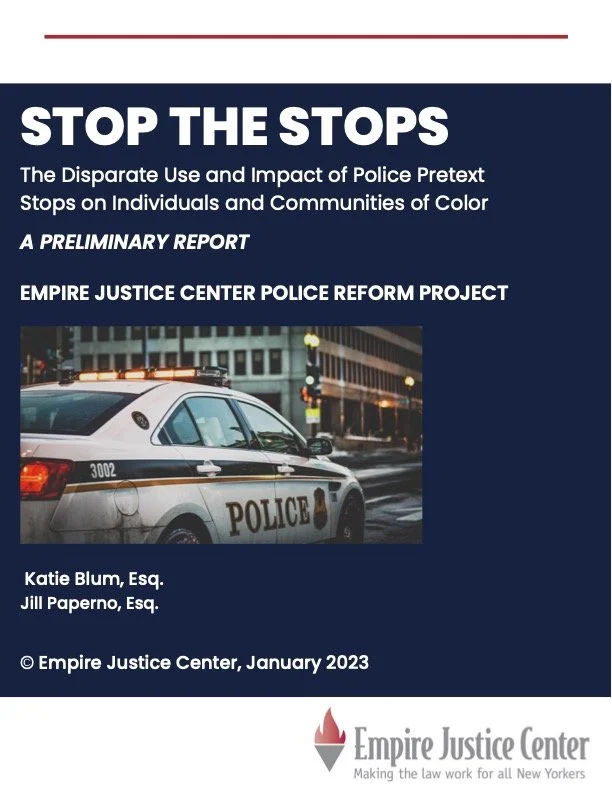Stop the stops: The Disparate Use and Impact of Police Pretext Stops on Individuals and Communities of Color . A preliminary report.
Katie Blum and. Jill Paperno
In recent years our country has faced a racial reckoning. One of the areas of focus has been racial bias in policing. In the following pages we will address the law enforcement practice of pretext stops – stopping individuals for a reason that may not be lawful but using a low-level traffic or other violation to justify the stop. The following report is our working draft of what will later be released as a comprehensive review of pretext stops in New York. In the coming months, Empire Justice Center will be gathering more information and feedback that will be incorporated into later reports. In Section III, the Introduction to this Report, we recognize that of the approximately 1,000 deaths of civilians during police-civilian encounters each year, approximately 10% occur during low-level traffic stops. We explain what pretext stops are, and how they came to be an integral part of modern policing. We preview the harm caused by pretext stops, further discussed in Section VII. In Section IV, Racial Bias and the Data, we review information gleaned from numerous studies, as well as two books – Pulled Over: How Police Stops Define Race and Citizenship, by Charles Epp, Donald Haider and Steven Maynard-Moody, and Suspect Citizens: What 20 Million Traffic Stops Tell Us about Policing and Race, by Frank Baumgartner, Derek Epp and Kelsey Shoub. These sources demonstrate that pretext stops are executed far more frequently on People of Color, with most studies focusing on Black and white drivers. Additionally, once stopped, Black drivers are more likely to be searched than white drivers. In Section V, The Law and Pretext Stops, we explain the cases that have led to the conclusion that absent proof of discriminatory intent on the part of a law enforcement officer, a high bar to reach, pretext stops are lawful. In Section VI, The Community Safety Question, we address findings that pretext stops provide minimal enhancement of community safety, reviewing studies that have addressed the frequency of seizure of contraband, as well as arrests and charges of individuals stopped. In Section VII, The Harms Caused by Pretext Stops, we consider whether these minimal community safety benefits are worth the many harms caused by pretext stops – racial disparities in how policing occurs, civilian deaths, officer deaths, and the resulting lack of trust in law enforcement and the criminal justice system. In Section VIII, Pretext Stops in Rochester, N.Y., we focus on the types of offenses that are the basis for some pretext stops in Rochester, New York, a city that has faced rising tension and civilian opposition to policing in recent years, and the racial disparities as well as geographic disparities in where these stops occur. We also review some of the statements and implicit recognition of racial disparities in policing by community leaders who have considered pretext stops.
Albany, NY: Empire Justice Center, 2023. 71p.


